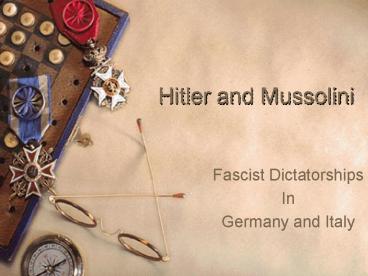Hitler and Mussolini - PowerPoint PPT Presentation
1 / 24
Title:
Hitler and Mussolini
Description:
Hitler and Mussolini. Fascist Dictatorships. In. Germany and Italy. Types ... Fascist. Colonial. Fascism. From Latin 'fasces' ... Fascists. The Nazis and Hitler ... – PowerPoint PPT presentation
Number of Views:71
Avg rating:3.0/5.0
Title: Hitler and Mussolini
1
Hitler and Mussolini
- Fascist Dictatorships
- In
- Germany and Italy
2
Types of Government
- Monarchy
- Dictatorship
- Democracy
- Socialist/Communist
- Fascist
- Colonial
3
Fascism
- From Latin fasces
- In ancient Rome, this was a bundle of rods bound
tightly around an ax, symbolizing government
authority. - Brought to power by Benito Mussolini in Italy
during 1920s.
4
Benito Mussolini
- Early writings brought jail time and a period in
exile. - Considered an extreme nationalist.
- Expelled by the Italian Socialist Party.
- After Italy joined Allies in WWI, he enlisted in
the army and was wounded in battle.
5
Benito Mussolini
- Robert Leckies book Delivered from Evil,
described Mussolini as having a surprisingly weak
appearance, but However, like Napoleon, he could
strike fear into men twice his size with a direct
glance from those astonishing eyes.
6
Mussolini Fascism
- Fascism is similar to communism in that it relies
on dictatorial rule and a totalitarian regime. - All authority belonged to the state.
- However, there are major differences in Fascism
and Communism.
7
Fascism vs. Communism
- Fascism appeals to Middle Class.
- Relies on nationalistic goals and the
perseverance of the existing social status. - Defends ownership of private property.
- Whereas Communism seeks a socialist economy and
international revolution. - Both systems violently oppose one another.
8
Mussolinis Rise to Power
- First followers were demobilized soldiers and
discontented nationalists. - Gained respect of professionals, wealthy
landowners, and large manufacturers who sought to
block communist gains among workers. - Also attracted lower class who were unemployed or
hurt by inflation.
9
Mussolini and Anticommunism
- Mussolini promised to prevent a revolution.
- Fascism stood for protection of private property
and middle class. - Promised to return Italy to the glory of ancient
Rome. - Sought to strengthen the military.
10
Fascists Elected
- Fascists won election of 1924.
- Took power in 1925.
- Il Duce (doo-chay) Italian for the Leader.
- Mussolini was made head of the government and
was accountable to no one.
11
Italian Police State
- Opposition parties disbanded.
- Freedom of speech, press, assembly, and trial by
jury were suspended. - Labor unions outlawed.
- Secret Police spied on everyone.
- Dictatorship emerged.
12
The Corporatist State
- Mussolini introduced corporatism as the new
system of governance. - Agriculture, transportation, manufacturing, and
commerce were formed into syndicates resembling
corporations. - By 1930s, 22 corporations existed.
- All parts of society forced to cooperate.
13
Fascists
14
The Nazis and Hitler
- Nazis, or National Socialist Workers Party
formed in Germany during 1920s. - Extremely nationalistic and violently
anti-communist. - Promised to protect Germany from communism.
- Attracted support of wealthy and laborers.
15
Adolf Hitler
- Born in Austria 1889.
- Failed as an artist in Vienna.
- Resentful of Jews. (Anti-Semitic)
- Fought World War One in German army.
- Head of Nazis in 1921.
- Failed uprising in 1923 landed Hitler in jail.
16
Mein Kampf
- Written by Adolf Hitler during imprisonment in
1923. - Means My Struggle.
- Hitler produced goals for Germany.
- Ignited nationalist feelings about the failure of
the Treaty of Versailles.
17
Hitlers Rise to Power
- Nazis had few followers until Great Depression
in 1930s. - Election of 1930, middle class turned to Nazi
Party. - Hitler appointed Chancellor in 1933.
- Used political savvy to become dictator.
18
Hitler in Action
- Took title der Fuhrer meaning the leader.
- Turned Germany into a police state.
- Banned opposition parties, labor unions, and
opposition newspapers.
19
Hitlers Police State
- Gestapo was the German secret police agency.
- Many executions and anti-Semitic violence.
- Liberals, socialists, and communists often killed
or interned.
20
The Jewish Question
- Hitler sought to remove Jews from all positions
in society and in private. - Concentration camps built to exterminate Jews on
a wide scale. - Forced Jews to extreme measures of racism.
- Many millions of Jews died under Hitler.
21
The Third Reich
- Hitler promised his regime would last 1,000
years. - Reich is German for empire.
- First Empire in Germany was Holy Roman Empire,
Second was the Empire of the Hohenzollerns.
22
Lebensraum
- Hitler sought living room for its population.
- Germany not a world colonial power.
- Sought to expand internally into Slavic
countries. - Hitler preached German superiority over Slavs in
Eastern Europe.
23
Rome-Berlin Axis
- Hitlers Germany and Mussolinis Italy became
quick allies. - 1936 both leaders signed the Rome-Berlin Axis
treaty. - After Hitlers invasion of the Rhineland and
Mussolins invasion of Abyssinia. - France and Great Britain too weak to act.
24
The Coming of War
- Expansion of Italy and Germany threatened
interests of many nations. - France, Great Britain, U.S.S.R., and the United
States in particular. - Italy and Germany soon faced another war.































